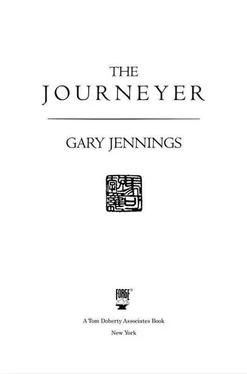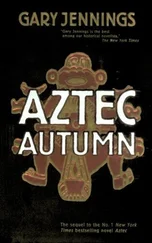“Is your name on it?”
“Yes.” I pointed with pride. “There. That is my name, my lady.”
“I have learned that it is not always wise to commit things to paper.” She folded and tucked the paper into her bodice. “I will keep this safe.” I started to tell her just to tear it up, but she went on, sounding peevish, “I hope you realize that you were very foolish to come here unbidden.”
“I waited to make certain he left.”
“But if someone else—if one of his relatives or friends was here? Listen to me now. You are never to come here again until I summon you.”
I smiled. “Until we are free of—”
“Until I summon you. Now go, and go quickly. I am expecting—I mean, he may come back any minute.”
So I went home and practiced some more. And the next day, when at sundown the pompe funebri began, I was among the spectators. Even the least commoner’s burial in Venice is always dignified by as much pageantry as his or her family can afford, so the Doge’s was splendid indeed. The dead man lay not in a coffin but on an open litter, dressed in his finest robes of state, his stiff hands clasping his mace of office, his face fixed by the pomp-masters in an expression of serene sanctimony. The widowed Dogaressa stayed always beside it, so draped in veils that only her white hand was visible where it rested on her late husband’s shoulder.
The litter was first laid on the roof of the Doge’s great buzino d’oro, at the prow of which the gold-and-scarlet ducal flag hung at half staff. The bark was rowed with solemn slowness—the forty oars seeming scarcely to move—up and down the main canals of the city. Behind it and around it were grouped black funeral gòndole and crape-hung batèli and burchielli, bearing the members of the Council and the Signoria and the Quarantia and the city’s chief priests and the confratèli of the arti guilds, the whole retinue alternately singing hymns and chanting prayers.
When the dead man had been sufficiently paraded on the waterways, his litter was lifted off the bark and onto the shoulders of eight of his nobles. Because the corteggio then had to wind up and down all the main streets of the central city, and because so many of the pallbearers were elderly, they changed places frequently with new men. And the litter was again followed by the Dogaressa and all the other court mourners, now on foot, and by bands of musicians playing doleful slow music, and contingents from the flagellant brotherhoods lethargically pretending to whip themselves, and finally by every other Venetian not too young or old or crippled to walk.
I could do nothing during the water-borne procession except watch it from the banks with the rest of the citizens. But by the time it came ashore, I decided that good fortune was attending my scheme. For there also came in from the water the twilight caligo again, and the obsequies became even more melancholy and mysterious, shrouded by fog, the music muffled and the chants lugubriously hollow.
Bracket torches were lighted along the route, and most of the marchers took out and lighted candles. For a while I walked among the common herd—or limped, rather, since the sword along my left leg forced me to swing it stimy—and gradually eased myself to the forefront of that throng. From there I could verify that almost every official mourner was cloaked and hooded, except the priests. So was I well covered, and in the thick mist I could be taken for one of the guilds’ artists or artisans. Even my size was not conspicuous; the procession included numerous veiled women no bigger than I was, and a few cowled dwarfs and hunchbacks smaller than I was. So I edged my way imperceptibly among the court mourners, and ever farther forward, being challenged by nobody at all, until I was separated from the litter and its pallbearers only by a rank of priests yammering their ritual pimpirimpàra and swinging censers to add smoke to the fog.
I was not the only inconspicuous marcher in the procession. What with everybody being so shrouded in cloth and in the almost equally woolly mist, I had a hard time picking out my quarry. But the street march was long enough that, by moving cautiously from side to side and peering sharply at the little of each man’s profile that protruded beyond his cowl, I at last was able to perceive which was Ilaria’s husband, and thereafter I kept my eye on him.
My chance came when the corteggio finally debouched from a narrow street onto the cobbled embankment of the city’s north shore—on the Dead Lagoon, not far from where the boat children’s barge lay, though that was invisible in the fog and the now near-dark. Alongside the embankment was the Doge’s bark, which had circled the city to get ahead of us, waiting to ferry him on his last voyage—to the Isle of the Dead, also invisible far offshore. There was a milling of the mourners, as all the men nearest the litter tried to help its bearers hoist it aboard the bark, and that gave me the opportunity to mingle in with them. I elbowed until I was right beside my quarry, and in all the shoving and bustling no one remarked the struggle I had to make to unsheathe my sword. Fortunately, Ilaria’s husband did not manage to get his shoulder under the litter—or the dispatching of him might have meant the Doge’s getting dropped into the Dead Lagoon.
What did get dropped was my heavy scabbard; somehow my fumbling had unhooked it from my tunic belt. It clattered heavily onto the cobblestones and kept on noisily proclaiming itself as the many shuffling feet kicked it about. My heart bounded into my throat and then almost popped out of my mouth as Ilaria’s husband bent down to pick up the scabbard. But he made no outcry; he handed it back to me with the kindly comment, “Here, young fellow, you dropped this.” I was still right next to the man, and both of us were still being buffeted by the movement of the crowd around us, and my sword was in my hand beneath my cloak, and that was the moment to strike, but how could I? He had saved me from immediate discovery; could I stab him in return for the favor?
But then another voice spoke, hissing beside my ear, “You stupid asenazzo!” and something else made a rasping noise, and something metallic glinted in the torchlight. It happened at the edge of my vision, so my impressions were fragmentary and confused. But it appeared to me that one of the priests who had been swinging a golden censer had abruptly swung something silvery instead. And then Ilaria’s husband leaned into my view, and opened his mouth and belched a substance that looked black in that light. I had done nothing to him, but something had happened to him. He tottered and jostled against the other men in the bunched group, and he and at least two others fell down. Then a heavy hand clutched at my shoulder, but I yanked away from it, and the recoil took me out of the center of the tumult. As I struggled through the outer fringe of people, and caromed off a couple of them, I again dropped my scabbard and then the sword as well, but I did not pause. I was in panic and I could think of nothing but to run fast and far. Behind me I heard exclamations of astonishment and outrage, but by then I was well away from the massed torch and candlelight and well away into the blessed darkness and fog.
I kept on running along the embankment until I saw two new figures taking form before me in the misty night. I might have shied away, but I saw they were children’s figures and, after a moment, they resolved themselves into Ubaldo and Doris Tagiabue. I was ever so relieved to see someone familiar—and small. I tried to put on a glad face and probably put on a ghastly one, but I hailed them jollily:
“Doris, you are still scrubbed and clean!”
“You are not,” she said, and pointed.
Читать дальше












